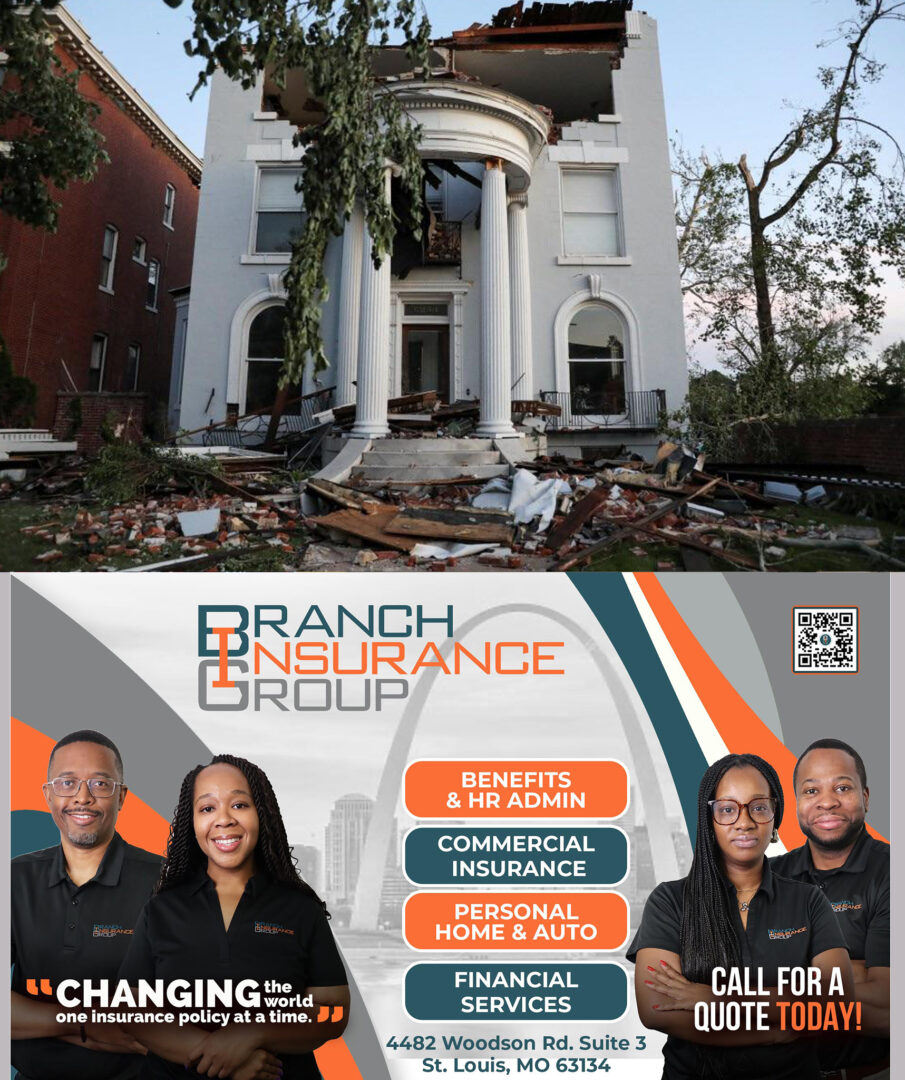

Sponsored by The Branch Insurance Group and STL Black Biz

When a major weather event strikes, it can leave your property and belongings damaged, creating an overwhelming and stressful situation. To ease the process of recovering and rebuilding, careful communication with your insurance company is key. Here’s a step-by-step guide on what to discuss with your insurer to ensure a smooth claims process.
Step 1. Initiate your claim promptly
Time is of the essence after a major event. Begin by notifying your insurance company as soon as it is safe to do so.
- Share a detailed description of the incident, including the date, time, and location of the damage.
- Make sure your insurer has your current contact information and the correct address for the damaged property.
Prompt action helps to get the ball rolling, minimizing delays in processing your claim.
Step 2. Document the damage thoroughly
Accurate documentation is crucial for supporting your claim. Take the following steps to ensure you adequately record the damage:
- Photograph and video everything: Capture detailed images and videos of the damaged areas, focusing on both the interior and exterior.
- Itemize damaged belongings: Create an inventory of damaged or destroyed items, including descriptions, quantities, ages, and approximate original values.
- Keep receipts and invoices: Save receipts and other documents proving ownership and value of the items.
- Don’t discard damaged items yet: Wait for the adjuster to inspect everything before throwing anything out.
Thorough documentation helps strengthen your claim and avoids disputes later.
Step 3. Understand your coverage and the claim process
Understanding your coverage is essential for managing expectations. Discuss the following with your insurer or adjuster:
- How your claim will be processed and what to expect during the stages of the claim.
- Details about your coverage, including any exclusions.
- Your policy limits and the deductible that applies.
- Whether your policy applies an Actual Cash Value (ACV) or Replacement Cost Value (RCV) for reimbursement.
Knowledge of these details will help you avoid any surprises.
Step 4. Discuss mitigation and repairs
Preventing additional damage is critical during this phase. Here’s what you should ask your insurer:
- What immediate steps should you take to prevent further damage?
- Can you hire a cleanup or restoration service?
- Are the costs of temporary repairs covered? If so, what is the process?
- When can permanent repairs begin, and what approvals are required?
It’s also helpful to obtain estimates from reputable contractors for planned repairs, as these may be needed when working with your adjuster.

Step 5. Clarify settlement details
Ensure you fully understand how your settlement will be handled. Key questions to ask include:
- Are you entitled to receive an advance to cover immediate expenses?
- How will the total settlement amount be calculated?
- When and how will settlement funds be disbursed?
Being informed about the settlement process allows you to plan financial recovery efforts effectively.
Step 6. Keep a record of all communications
Stay organized by maintaining detailed records of all interactions with your insurance company:
- Log all phone calls, emails, and meetings. Include dates, times, and a summary of the conversations.
- Follow up important discussions with confirmation emails to recap key points or agreements.
This ensures there’s a written account of everything, which is especially valuable if disputes or misunderstandings arise.
Step 7. For business owners
If you’re a business owner, additional discussions may be necessary to cover more complex losses. Ask about:
- Options for rebuilding or replacing damaged property to current building codes.
- Coverage for lost business income or sales during downtime.
- Insurance for emergency expenses, relocation costs, and payroll during recovery.
These aspects can be critical in getting your business back on track.
Important Notes to Keep in Mind
- Be factual and honest when reporting damage. Avoid offering opinions or speculating on the cause.
- If you’re unsure about any part of the process, ask your insurance agent or adjuster for clarification.
- If your claim is denied or you feel you’re not being fairly compensated, consider seeking legal advice or engaging a public adjuster.
Final Thoughts
Navigating the aftermath of a major weather event is never easy, but proactive communication with your insurance company can help smooth the recovery process. By following this guide, you’ll be better prepared to secure the compensation you need to rebuild and move forward confidently.
Take the first step today by thoroughly documenting your damage and initiating your claim without delay!

#InsuranceTips #StormRecovery #DisasterPreparedness
